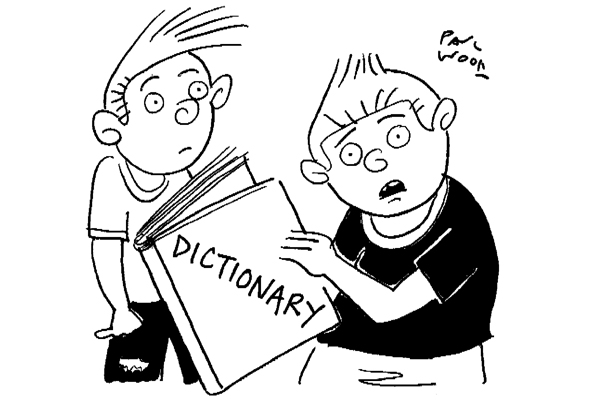This article is in
The Spectator’s December 2019 US edition. Subscribe here.
Kemmerer, Wyoming
Before 1965, when immigrants to the American Republic came almost exclusively from Europe, the largest white ethnic group in this country was of German stock. It may still be so, though I am unaware of recent statistics that demonstrate the fact. Certainly, a linguistically sophisticated visitor arriving here today from Europe might easily arrive at that conclusion. The now ubiquitous ‘Yah!’ is phonetically indistinguishable from ‘Ja!’, and while ‘Yah-wohl!’ has yet to be widely heard in American streets, connoisseurs of the American language in the 21st century would hardly be surprised should it crop up there. Might Germany actually have won the Great War in 1918 and World War Two in 1945, without the Allies having taken notice of the fact? Perhaps everyone was having too good a time on the home front to pay attention.
Other explanations are certainly plausible. ‘Yah’, as trained singers know, takes far less skill and effort, for Americans at least, to pronounce than ‘yes’. In the first instance the speaker emits a flat sound, like a donkey’s bray, from the roof of his mouth. In the second he sets his tongue against the back of the lower incisors to produce a forward sound: ‘American’, rather than ‘Amurrican’. Americans, having no need to converse regularly with Continentals as the English do, have no familiarity with the Romance pronunciation of the ‘e’ vowel, as in the Italian ‘americano’ and the French ‘américain’. Placing the sound at the front of the mouth takes a degree of effort and attention that speakers of American English are generally unwilling to make, though educated Englishmen, better acquainted with the practice owing to its application to spoken British English, are more athletic in their verbal delivery.
It is true that the mass media, abetted by public educational systems, have exerted a dreadful influence on every language everywhere in the world. The French now say ‘whih’ for ‘oui’, and peninsular Italians of the lower orders often sound as if they are trying to speak the Sicilian dialect, even if ‘sì!’ is a difficult word to mispronounce. I do not know how far the Germans have departed from the standard, as I forgot my first-year German decades ago and have never visited das Reich in its present instauration. I suppose they just say ‘Ja!’, as Beethoven and Goethe did. Still, I cannot avoid the suspicion that the American language of today must be the most carelessly spoken and written of any lingo on Earth.
Part of the problem, as I say, is sheer mental and physical laziness. But there is a good deal more to it, notably including the extent to which the media have nearly destroyed English as a spoken and a written language. I understand that anchormen and women are trained to sound like middle-class citizens bred and raised in the Great Salt Lake Valley, speaking with an accent (or rather absence of one) that is imagined to make all Americans equally comfortable.
The women, especially, appear to have been taught to place their voices in the roof of the mouth and toward the back, thus producing a sound that is flat and muddy so that ‘well’ comes out as ‘wull’ — as far away from the forward sound used by classical singers as one can get.
A talk-show or news host will do this a few hundred times in the course of an hour. It is responsible also, I suspect, for the tendency of middle-class adult women from Middle America to sound like high-school girls — like Betty Boop. Their intellects must be partly to blame for this, too, but there is nothing they or anyone else can do about that.
The faulty accent and intonation one hears across the media inevitably influence the speech of scores of millions of their listeners, which is why even people from New England sound as if they come from Provo, Utah. Worse still is the rapid-fire delivery, like that of a maladjusted AK-15, which Americans have picked up from listening to the television news and talk shows. It is this horrible habit, more than anything else, that has degraded public rhetoric in the mediatized age, from the familiar mediocrity of democratic political speech in earlier times to a brutish cacophony in which the accurate choice and application of words are wholly overlooked, along with syntax and the correct identification and use of prepositions. It is as if English were a second language for all these so-called talking heads.
The reason is plain. The constraints imposed by the broadcast media cause interviewers and interviews alike to try to pack the maximum number of words into the minimal time they are allowed before the host cuts them short and the advertising people take over the show. The result is the barnyard gabble they produce under such pressure. Nevertheless, one might think that the more experienced of them would have learned that fewer syllables uttered and debate points scored would allow them to sound slightly more like the Pericleses, Gladstones or Churchills they will never be.
But this is merely a matter of bad delivery, the linguistic equivalent of a tone-deaf cellist mangling a Bach sonata. Far worse is the attempt by semiliterate people to improve upon a language they never mastered in the first place. The comparison here is with the same cellist replacing the maestro’s musical idioms with those of his own untutored invention.
Idioms, in speech as in music, arise, develop and, in the fullness of time, establish themselves in their language of origin. Now, in the age of the electronic mass media, they are of immediately recent though equally anonymous invention, hatched out in swarms like biting gnats after a rainstorm.
Almost always they consist of familiar words and phrases used in ignorant, banal and relentlessly repetitive ways and contexts by the sort of people to whom neologisms adhere like flies to flypaper. ‘At the end of the day’: after a couple of decades, this day is of greater duration than most. ‘On the other side of the equation’ when no equation has been introduced. ‘Dialogue’ for ‘conversation’, and ‘conversation’ for ‘argument’. ‘Multiple’ for ‘many’. ‘Ramp up’ for ‘increase’. ‘Going forward’ for ‘in future’. ‘Ramifications’ for ‘effects’. ‘Mindset’ for ‘state of mind’. ‘Process’ for ‘procedure’.
Such idiocies appeal to people who, like crows, are attracted to bits of paste jewelry lying scattered about, and who, like parrots, repeat phrases they have overheard with insistent monotony until they are taught new ones. The obvious efficient cure is for them to be separated from their electronic gadgetry and set to memorizing Orwell’s ‘Politics and the English Language’ in some re-education camp deep in the Great American Desert.
This article is in The Spectator’s December 2019 US edition. Subscribe here.



















